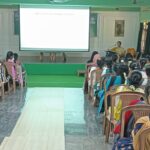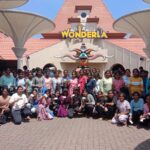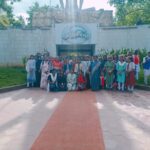Nutrition and Dietetics
- Home
- Nutrition and Dietetics

NUTRITION & DIETETICS DEPARTMENT

























- STET’s Department of Nutrition & Dietetics was established in 1996 as the first Department of Nutrition and Dietetics under the Bharathidasan university. Since the inception, the Department has played a vital role in establishing Nutrition as an academic subject and encouraging public interest in the food we eat and its effect on our health.
- The Department of Nutrition & Dietetics is at the forefront in teaching Food and Nutritional Science related subjects, with a reputation built over for more than sixteen years as a leader in this arena of study under the roof of the Bharathidasan University.
- The curriculum of undergraduate program in Nutrition & Dietetics (N&D) and postgraduate programme in Food Service Management and Dietetics (FSMD) are structured and designed by Board of Studies of the Bharathidasan University. The focus area of research of the department is mainly based on the fundamental scientific principles and their application to ensure to address the concern of the consumers, government and industry. Students are ultimately motivated to demonstrate applied excellence in their specialized area, as well as professionalism, flexibility, the ability to adapt to team work situations, creativity and innovation towards a food product development. This programme is designed to provide intensive practice with regard to dietetic and food industry with ultimate motive of preparing the students as a quality human resource in the vibrant and expanding sector of food, food safety and food security.
- The department continues to explore the effect of food in health and quality of life. There are three main areas of research which include public health, the therapeutic basis of nutrition and eating disorders. The Department has witnessed phenomenal growth from an undergraduate to post-graduate department with a strong potential to grow up to the research level in due course of time. Besides being a constituent of the premier institution, the Department is fortunate enough to have MOU signed with various hospitals, institutions and industries for the development of infrastructure, towards strengthening teaching and research.
- Providing Value based education in Nutritional Sciences, Dietetics and Public Health Nutrition to the rural women students to construct the healthy and blooming society.
- Mentoring the students by imparting skill based knowledge to suit hospital and hospitality industry requirements and promote a healthy society
- Conscientise the students on food, nutrition and diet and to develop entrepreneurial skills for self employment.
- To build a programme on the foundation of food and to develop an appreciation for current issues in Nutrition and Dietetics.
- To offer solid knowledge in biology and chemistry which is applied to studies of food and nutrient metabolism.
- To prepare the students to work effectively with individual’s families and communities to plan, develop and manage relevant nutrition programs.
PO No. | Programme Outcomes (Upon completion of the B.Sc. Degree Programme, the Undergraduate will be able to) |
PO-1 | Disciplinary knowledge: Demonstrate comprehensive knowledge and understanding of one or more disciplines that form a part of an undergraduate program of study in Bachelor of Science. |
PO-2 | Critical thinking, Problem Solving and Reflective thinking: think critically about the issues and identify, critically analyze and solve problems from the disciplines of concern using appropriate tools and techniques and the knowledge, skills and attitudes acquired and extrapolate the same to real life situations;show critical sensibility to life experiences, with self awareness and reflexivity of both self and society. |
PO-3 | Analytical & Scientific Reasoning: evaluate the reliability and relevance of evidence; identify logical flaws and holes in the arguments of others; analyze and synthesize data from a variety of sources; draw valid conclusions and support them with evidence and examples and addressing opposing viewpoints; critically evaluate ideas, evidence, and experiences from an open minded and reasoned perspective. |
PO-4 | Research-related Skills: develop a sense of capability for relevant/appropriate inquiry and asking questions, synthesize, articulate and report results and to recognize and predict cause and effect relationships, define problems, formulate and establish hypothesis, analyze and interpret and draw conclusions from data, execute and report the results of an experiment or investigation. |
PO-5 | Digital literacy and Effective Communication: use ICT in a variety of learning situations and speak, read, write and listen clearly in person and through electronic media in English and in one or more Indian languages, and make meaning of the world by connecting people, ideas ,books, media and technology; efficiently communicate thoughts and ideas in a clear and concise manner. |
PO-6 | Individual and Team Work: effectively accomplish tasks individually as well as work effectively and respectfully as member or leader with diverse teams, facilitate cooperative or coordinated effort on the part of a group,and act together as a group or a team in the interest so for a common cause and work efficiently as a member of a team. |
PO-7 | Multicultural Competence and Social Interaction: understand the values and beliefs of multiple cultures, global perspectives, engage and interact respectfully with diverse groups and elicit views of others, mediate disagreements and help reach conclusions in group settings. |
PO-8 | Awareness of Ethical issues, Human values and Gender Issues: embrace moral/ethical values in conducting one’s life, formulate a position/argument about an ethical issue from multiple perspectives, and use ethical practices in all work and understand the value of relationship between self and the community and aware of the various issues concerning women and society. |
PO-9 | Awareness of Environment and Sustainability: understand the impacts of technology and business practices in societal and environmental contexts, and sustainable development. |
PO-10 | Self directed and Lifelong learning: acquire knowledge and skills, including learning “how to learn‟, that are necessary for participating in learning activities throughout life and to engage in independent and life-long learning in the broadest context of socio- technological changes. |
PO.No | Programme Outcomes (Upon completion of the M.Sc.,Degree Programme, the Post graduate will be able to) |
PO-1 | Disciplinary Knowledge: demonstrate in-depth knowledge and understanding of theories, policies, and practices in one or more disciplines that form a part of a Post Graduate program of study in Master of Science. |
PO-2 | Critical Thinking and Problem Solving: apply analytic thought to a body of knowledge, analyse and evaluate evidence, arguments, claims, beliefs on the basis of empirical evidence, identify relevant assumptions or implications, formulate coherent arguments, critically evaluate practices, policies and theories by following scientific approach to knowledge development: solve problems and extrapolate the same to real life situation |
PO-3 | Information/digital literacy and Communication Skills: use ICT in a variety of learning situations, demonstrate ability to access, evaluate, and use a variety of relevant information sources, and use appropriate software for analysis of data: communicate thoughts and ideas analytically and effectively in writing and orally using appropriate media, and present complex information in a clear and concise manner to different groups. |
PO-4 | Research-related skills: conduct independent inquiry in a chosen scientific discipline, demonstrate sense of inquiry and capability for asking relevant/appropriate questions, problematising, synthesizing and articulating; recognize cause-and-effect relationships, define problems, formulate hypotheses, test hypotheses, analyse, interpret and draw conclusions from data, establish hypotheses, predict cause-and-effect relationships; plan, execute and report the results of an experiment or investigation. |
PO-5 | Scientific reasoning and Reflective Thinking: analyse, interpret and draw conclusions from quantitative/qualitative data and critically evaluate ideas, evidence and experiences from an open-minded and reasoned perspective; critically and sensibly evaluate life experiences, with self awareness and reflexivity of both self and society. |
PO-6 | Multidisciplinary Approach, Innovation and Entrepreneurship: propose novel ideas of interdisciplinary approach in providing better solutions and new ideas for the sustainable developments; identify opportunities, entrepreneurship vision and use of innovative ideas to create value and wealth for the betterment of the individual and society. |
PO-7 | Moral and ethical awareness/reasoning: embrace moral/ethical values in conducting one’s life, formulate a position/argument about an ethical issue from multiple perspectives, and use ethical practices in all work, demonstrate the ability to identify ethical issues related to one’s work, avoid unethical behavior such as fabrication, falsification or misrepresentation of data or committing plagiarism, not adhering to intellectual property rights, appreciate environmental and sustainability issues, and adopt objective, unbiased and truthful actions in all aspects of work. |
PO-8 | Self directed Learning: work independently, identify appropriate resources required for a project, and manage a project till completion. |
PO-9 | Lifelong Learning: engage in continuous learning for professional growth and development, acquire knowledge and skills, adapt to changing environment and to changing trades and demands of work place through knowledge/skill development/reskilling. |
PO-10 | Multicultural Competence, Social Interaction and Effective Citizenship: understand the values and beliefs of multiple cultures, global perspectives, engage and interact respectfully with diverse groups and elicit views of others, mediate disagreements and help reach conclusions in group settings, and demonstrate empathetic social concern and equity centred national development |
PSO No. | Program Specific Outcomes (B.Sc., Nutrition and Dietetics) |
PSO1 | Placement: To prepare the students who will demonstrate respectful engagement with others’ ideas, behaviors, beliefs and apply diverse frames of reference to decisions and actions |
PSO2 | Entrepreneur: To create effective entrepreneurs by enhancing their critical thinking, problem solving, decision making and leadership skill that will facilitate startups and high potential organizations |
PSO3 | Research and Development: Design and implement HR systems and practices grounded in research that comply with employment laws, leading the organization towards growth and development. |
PSO4 | Contribution to Business World: To produce employable, ethical and innovative professionals to sustain in the dynamic business world. |
PSO5 | Contribution to the Society: To contribute to the development of the society by collaborating with stakeholders for mutual benefit |
PSO No. | Program Specific Outcomes (M.Sc., Food service Management and Dietetics) |
PSO1 | Placement: To prepare the students who will demonstrate respectful engagement with others’ ideas, behaviors, beliefs and apply diverse frames of reference to decisions and actions |
PSO2 | Entrepreneur: To create effective entrepreneurs by enhancing their critical thinking, problem solving, decision making and leadership skill that will facilitate startups and high potential organizations |
PSO3 | Research and Development: Design and implement HR systems and practices grounded in research that comply with employment laws, leading the organization towards growth and development. |
PSO4 | Contribution to Business World: To produce employable, ethical and innovative professionals to sustain in the dynamic business world. |
PSO5 | Contribution to the Society: To contribute to the development of the society by collaborating with stakeholders for mutual benefit |
| S. No. | Programmes Offered | Year of Establishment |
| 1 | B. Sc., Nutrition & Dietetics | 1995-96 |
| 2 | M. Sc., FSM&D | 1998-99 |
















